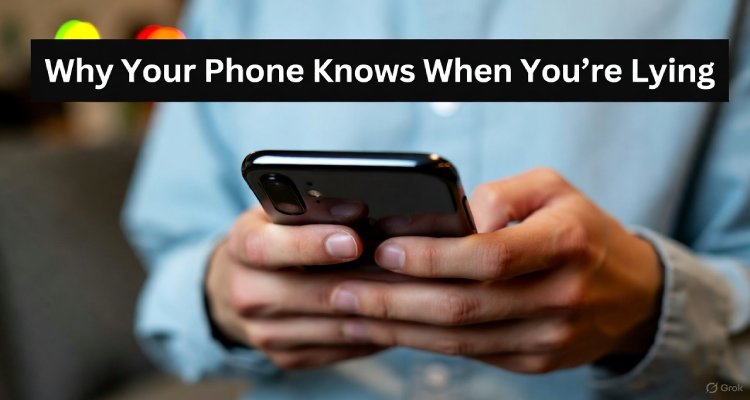Why Your Phone Knows When You’re Lying

Modern smartphones can now detect lies through subtle cues in voice, typing, and micro-movements—reshaping privacy, truth, and trust in the digital age.
Introduction: The Lie Your Phone Can Hear
Imagine this — you tell a small lie over text, and your phone knows. Not because it’s reading your mind, but because it’s reading you. Your tone, typing rhythm, facial micro-movements, and even the way your hand trembles slightly — all can be analyzed by AI models embedded in today’s smartphones.
What sounds like science fiction is fast becoming scientific reality. The device in your pocket is turning into a lie detector.
The Science Behind Digital Deception Detection
Researchers from universities and major tech labs are exploring how biometric sensors and AI algorithms can detect deception in real time. Phones already monitor subtle biometric data — heart rate, micro-expressions, voice tremors, and screen pressure. When combined, these signals can create a behavioral “truth profile.”
For example, if you normally type fluently but suddenly start hesitating, backspacing, or using shorter phrases, an AI model can flag that as a sign of stress or potential deceit. Similarly, your smartphone’s microphone can pick up micro tremors in your voice — vibrations too faint for the human ear but detectable by machine learning systems.
Even front-facing cameras, often used for facial recognition, can now read micro-expressions — fleeting facial movements that reveal suppressed emotions.
From Security to Psychology: The Rise of Behavioral AI
Initially, this technology was developed for fraud detection and security verification. Financial institutions and border agencies have been experimenting with AI-based lie detection for years. But as the technology matures, it’s creeping into consumer devices.
Apple’s latest health and security patents reference emotion detection through facial data, while Android’s machine-learning frameworks already process behavioral signals for authentication.
Psychologists see a fascinating overlap — our devices aren’t just tools anymore; they’re mirrors of our emotional state. “Smartphones are becoming emotional sensors,” says Dr. Priya Menon, a behavioral technologist. “They learn not just what you say, but how you say it — and that changes everything about trust and privacy.”
Why It Matters: The Privacy Paradox
While the idea of phones detecting lies sounds futuristic, it also raises deep ethical concerns.
If your device can analyze your tone, expressions, and physical responses, who owns that data? Could such insights be used to manipulate or judge you?
Privacy experts warn that lie-detection algorithms could easily be misused — by employers monitoring remote workers, advertisers profiling consumer “honesty,” or even law enforcement agencies using biased AI interpretations.
“It’s not about whether the technology can detect lies,” notes privacy researcher Ethan Walsh. “It’s about who gets to decide what a lie is.”
Real-World Applications and Experiments
Some apps already experiment with this concept. Voice-analyzing programs like Nemesysco or X20 Detect claim to identify deception in speech by tracking micro-frequency variations. In marketing, emotion-detection AI gauges how sincere customers sound in feedback.
In healthcare, similar models help therapists track anxiety or trauma responses. In the corporate world, virtual job interviews sometimes analyze non-verbal cues to assess honesty and confidence — often without applicants’ full awareness.
The line between “helpful feedback” and “digital surveillance” is rapidly blurring.
Expert Insight: Can Technology Truly Detect Lies?
Despite progress, scientists remain divided.
Lie detection has always been probabilistic — even traditional polygraphs are far from foolproof. AI may add precision, but it still faces fundamental limits. Human emotions are complex, context-dependent, and culturally diverse.
“AI can detect anomalies,” explains cognitive scientist Dr. Alan Ortiz, “but an anomaly isn’t necessarily a lie. Stress, fear, excitement — they all look similar in data form.”
So while your phone may sense that something is off, it may not truly know why.
The Future: Trust in a Transparent World
The future of AI-driven honesty detection could redefine relationships — both personal and professional. Couples might soon use “emotion transparency” apps during arguments; employers could use it to gauge truthfulness in interviews; and social platforms might analyze voice notes to curb misinformation.
But with great power comes the ultimate question: should our phones judge our honesty?
Ethicists argue that technology should assist understanding, not enforce truth. As AI becomes more embedded in our emotional lives, maintaining human nuance — empathy, context, and forgiveness — will matter more than ever.
Conclusion: The Truth About Tech and Lies
Your smartphone doesn’t have intuition — it has algorithms. It doesn’t understand guilt or sincerity — it measures data points. Yet, those data points may soon reveal more about our inner truths than we’re comfortable admitting.
As AI continues to blur the boundary between mind and machine, one thing remains certain:
In the digital age, even your silence speaks volumes.
Disclaimer:This article is for informational and educational purposes only. It explores emerging technologies and ethical considerations around AI and behavior analysis. It does not claim that any specific device or company currently implements lie detection features.










